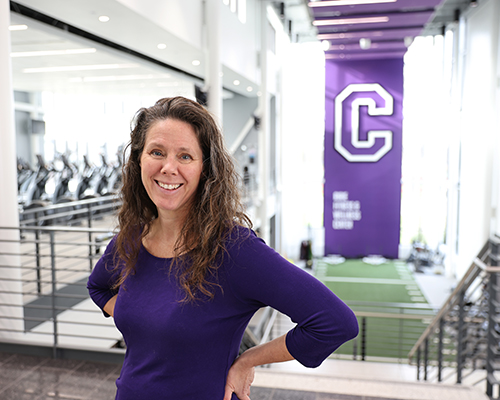
Associate Professor of Kinesiology Christi Johnson interviews older adults to explore how we question the meanings of health and thriving.
Much of my work returns to advice my father offered me decades ago: “Question everything.” In my research I interview older adults about their stories of “living the good life” to explore how we question the meanings of health and thriving.
An interview with Orville comes to mind. He demanded we meet for a 6 a.m. breakfast. Hale and hearty, he flexed his biceps and demanded, “Just punch it and guess how old I am.” After several failed attempts and a few punches, he took pity and told me he was 98.
A rural Midwesterner, Orville lived alone, cooked for himself, and drove “out to the farm” to sling bales to his cattle. He was a regular at coffee with “the boys,” active in church, and drove for Meals on Wheels to “deliver food to old people.” It seemed like he was quite healthy, but he said his doctor told him otherwise: high cholesterol, high blood pressure, and a cancer scare a few decades before. He snorted, “He wants to pump me full of drugs and tell me I’m going to die. But what does he know … he’s barely past 50. I’m going to die anyway, just on my own time.”
Somewhere in the storylines we hear are a set of narratives that define our “normal.” The more we allow those cultural narratives to dominate our own stories, the more we allow ourselves to be controlled by outside actors. Like Orville who questioned what it meant to be old, and even questioned his doctor’s definition of health, the (not-so-) Silent Generation narrated the power of questioning and critique.
Among their messages:
Believe you can do it. (Agnes, on keeping 2,200 chickens during the Great Depression, was told that women shouldn’t work.)
You look beautiful; worry less. (Gladys, on the invisibility of older women in the media.)
You don’t need to rest; you need to keep moving. (Don, on older people “slowing down.”)
Eat more vegetables, not that boxed crap they sell you. (Martha, gardener.)
Figure out what’s right or make it right; don’t dwell on what’s wrong. (Conrad, World War II veteran.)
Sports can teach you more about working together than they can about competing, if you do it right. (Marie, on Iowa girls’ 6-on-6 basketball.)
Spend your days doing meaningful work, even in retirement. And, whatever you do, don’t stop growing and changing, just because you get old. (Ken, on retiring.)
Orville’s deeper message was that self-definition—the ability to question everything—is a precious gift. He reminds us to look within, rather than outward (even to a well-meaning, but too young, physician) when considering the meaning of health and a life well-lived.